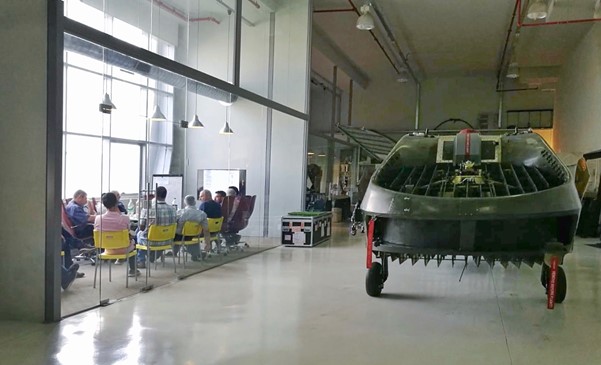With COVID-19 continuing to change how people live and work, perhaps permanently, innovative Israeli proptech companies are stepping up to serve the evolving needs of building owners, managers and developers.
According to IVC Research Center, there are approximately 8,300 active startups in Israel. These include a growing number of innovative proptech companies, some of which have already become active in the U.S. market.
Below are four emerging proptech trends, and the Israeli-based startups that are helping lead the way:
1. Virtual Building Tools - Augmind
In the U.S. and elsewhere, virtual building tools are increasingly being used to market properties when prospective clients are unable to visit showrooms or meet with brokers. One startup that is focusing on enhancing virtual marketing for new developments is Tel Aviv-based Augmind, which creates realistic 3D content for mobile, augmented reality (AR), and virtual reality (VR) applications.
The Augmind platform enables users to replace elements of a room’s design in real time. For example, a living room couch can be instantly viewed in a variety colors such as white, gray or black.
Virtual building tools have also become very popular, and in some cases the only way, to view existing homes for sale or rent during the pandemic. Leading residential real estate companies that have embraced this method include Compass, Brown Harris Stevens, Keller Williams and Corcoran.
“Technology is a tool for agents and brokerage companies. It helps enhance what we’re doing every day, and the services and value we bring to our clients and customers,” Corcoran President & CEO Pamela Liebman recently told a virtual audience at PropTech Nation. Sponsored by Tel Aviv- and New York-based venture capital firm BuiltUp Ventures, the virtual event focused on rebuilding the property sector in a new COVID-19 reality.
Liebman added: “There aren’t too many people who want to buy multi-million dollar apartments without being able to see them (due to COVID-19), but deals did get done. Because of the new camera and virtual reality technology that was available, we were able to pivot quickly to online showings.”
Online listing sites Redfin and Zillow also reported positive second quarter numbers “in part because virtual tours have become so effective,” according to a recent CNBC.com article.
2. Automated Building Services - MyTower
“No touch” automated building services now being employed in residential and office buildings throughout the world include property management platforms that can anticipate the needs of building occupants and remotely adapt to changing circumstances, such as air quality and rapid temperature fluctuations.
One Israeli company spearheading this technology is MyTower, which also provides a customer relationship management (CRM) system to monitor visitors, vehicles, deliveries and other building services, as well as remotely facilitate tenant communication and report maintenance issues.
International real estate company Gindi selected MyTower to provide a facility management services solution for Gindi TLV, a residential community in Israel with more than 1,400 apartments. The company created a shared platform for building management and tenants, with the ability to communicate via email, push notifications, or SMS to owners and tenants in a quick and easy way.
3. Blockchain Financing - SolidBlock
On the fundraising side, several companies are now digitally raising financing for building projects through blockchain-based securities. SolidBlock, which has offices in Jerusalem and New York, utilizes real estate asset tokenization to transform real estate into a tradable financial product, giving investors the opportunity to buy shares in a property without owning the entire building.
Recently, the company partnered with UK investment company London Chelsea Limited to raise financing for London Digital Bond, a new property fund that invests in prime residential real estate. This was SolidBlock’s first tokenized project in the UK, and the first time a single-family fund was financed through blockchain-based securities. The company is also known for tokenizing the St. Regis Resort in Aspen, Colorado, the first commercial property in the world financed this way.
More Liquidity
In traditional private equity investments, the funds invested are subject to a “lock-up” period in which the money cannot be taken out of the investment (via a trade or sale, for example). This requirement prevented the less wealthy from participating in this type of investment because the risk of being so illiquid was too great, as compared to higher net-worth individuals with the financial freedom to have large sums of money tied up and illiquid for an extended period of time. Equity crowdfunding is changing this landscape because the concept enables investors to purchase shares that can be traded in public markets. This, combined with the fact that equity crowdfunding regulations also allow for a higher number of shareholders per deal, means that there is a large potential market and greater liquidity. Should an investor decide to pull out of an investment after a year, they are likely to easily find a buyer for their shares.
4. Real Estate Crowdfunding 2.0
As the need for remote investing continues to grow due to the impact of COVID-19, sophisticated investors are increasingly looking online for vetted opportunities. Pioneers in this area include OurCrowd, an equity crowdfunding platform that enables people to invest in global startups and receive the same terms as VCs and institutional co-investors.
Established real estate crowdfunding platforms include Fundrise, Realty Mogul and CrowdStreet. A majority of these types of platforms provide information on their investment properties, but most do not have such increasingly sought-after online tools as videoconferences, webinars with company leaders, and in-depth research on where the market may be headed. However, a new equity crowdfunding platform scheduled to launch soon will provide exclusive access to Israel’s most promising proptech startups, combined with in-depth research and market knowledge.
Now more than ever, technology is becoming essential to real estate owners, managers and investors, and cutting-edge Israeli companies are at the forefront of this disruption.
Oded Eliashiv is Principal and Founding Managing Partner of BuiltUp Ventures, which invests in innovative, early-stage Israeli proptech companies. He is also Managing Partner of B-Seed, an investment arm of Besadno Group that invests in early-stage technology firms. A longtime entrepreneur, he has founded and led multiple startups including EPOS, a provider of advanced digital positioning technology to the PC peripheral, notebook and touch-screen markets.




